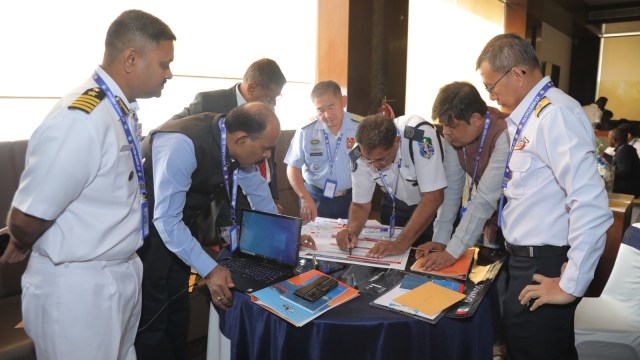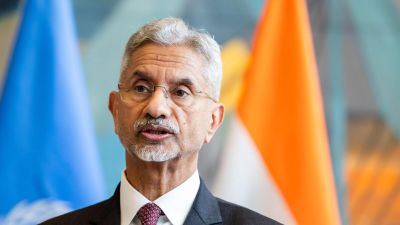Indian Coast Guard’s 9th national pollution response exercise begins in Jamnagar with special focus on Gulf of Kutch
More than 115 delegates representing about 70 stakeholder organisations, including oil refiners, are participating in the exercise.
 Delegates participate in a table-top exercise to respond a marine environment pollution event at the National Pollution Response Exercise-IX near Jamnagar on Friday. (Express Photo)
Delegates participate in a table-top exercise to respond a marine environment pollution event at the National Pollution Response Exercise-IX near Jamnagar on Friday. (Express Photo) The National Pollution Response Exercise-IX, the periodical exercise conducted by the Indian Coast Guard (ICG) to assess its preparedness to respond to any oil spill event at sea, began in Jamnagar Friday with special focus on the Gulf of Kutch through which 70 per cent of India’s mineral oil imports move.
More than 115 delegates representing about 70 stakeholder organisations, including oil refiners, are participating in the exercise. More than 31 delegates from 25 foreign countries are attending the event as observers.
 On the second day of the exercise, ICG ships will simulate their response to an imaginary oil spill event off the Vadindar coast on Saturday. (Express Photo)
On the second day of the exercise, ICG ships will simulate their response to an imaginary oil spill event off the Vadindar coast on Saturday. (Express Photo)
Addressing the inaugural ceremony of the two-day event, Rakesh Pal, director general (DG) of ICG, underlined the fragile ecosystem of the Gulf of Kutch and the gulf’s importance as the gateway to India’s oil imports.
“Gulf of Kutch is an environmentally-sensitive area due the location of the Marine National Park in Devbhumi Dwarka and 42 islands along the Jamnagar coast which are the habitats of many marine species, including 70 species of sponges, 52 species of corals and 90 species of birds. It is the hub of India’s three major oil refineries and handles almost 130 million metric tonne of oil annually as imports, more than 50 metric tonne of exports and has one more than one single-point mooring,” Pal said adding, almost 70 per cent oil shipments imported into India land on the coast of Gulf of Kutch.
 Indian Coast Guard Director General Rakesh Pal addressed the inaugural session of the National Pollution Response Exercise-IS at Vadinar Near Jamnagar in Gujarat on Friday. (Express Photo)
Indian Coast Guard Director General Rakesh Pal addressed the inaugural session of the National Pollution Response Exercise-IS at Vadinar Near Jamnagar in Gujarat on Friday. (Express Photo)
The Kandla port in Kutch and Vadinar near Jamnagar are the major landing points of imported crude oils in India. Additionally, Reliance Industries and Nayara Energy Limited, India’s two major private oil companies, too have their refineries in Jamnagar and Devbhumi Dwarka districts, respectively, and have their own private jetties on the Gulf of Kutch.
However, the coast of the gulf is lined by rich mangroves and also includes the Khijadiya Bird Sanctuary, a protected area designated as a wetland of international importance by the Ramsar Convention as it supports a number of international migratory species of birds. The gulf also provides livelihood to hordes of fishing communities.
On the second day of the exercise, ICG ships will simulate their response to an imaginary oil spill event off the Vadindar coast on Saturday.
 ICG is the executing agency of India’s National Oil Spill Disaster Contingency Plan. (Express Photo)
ICG is the executing agency of India’s National Oil Spill Disaster Contingency Plan. (Express Photo)
Inspector General Anil Kumar Harbola, who is the commander of ICG’s North West region, which covers the Gujarat coast, said that when a maritime disaster takes place, responders have to work in very challenging conditions.
“Maritime accidents, unfortunately, continue to happen and when they occur, the scene is in a very hostile environment,” Harbola said, referring to a fire on board an oil tanker off Kandla port in 2018.
Indian Coast Guard is the nodal agency for leading and cording response to oil and chemical spills along the Indian coast. Not only that, ICG has been designated as the competent authority for dealing with oil and chemical spills in the South Asian Seas regions under the South Asian Cooperative Environment Programme (SACEP) which has Bangladesh, India, Maldives, Pakistan and Sri Lanka as its members.
A documentary screened at the inaugural ceremony by the ICG said that on average, 7000 petroleum, oil and lubricant tankers call on Indian ports every year and there are 228 offshore assets, hence the need for preparedness for responding to any oil or chemical spill events.
 A documentary screened at the inaugural ceremony by the ICG said that on average, 7000 petroleum, oil and lubricant tankers call on Indian ports every year and there are 228 offshore assets, hence the need for preparedness for responding to any oil or chemical spill events. (Express Photo)
A documentary screened at the inaugural ceremony by the ICG said that on average, 7000 petroleum, oil and lubricant tankers call on Indian ports every year and there are 228 offshore assets, hence the need for preparedness for responding to any oil or chemical spill events. (Express Photo)
ICG is the executing agency of India’s National Oil Spill Disaster Contingency Plan. ICG’s oil spill response teams remain stationed at Vadinar in Gujarat, Mumbai in Maharashtra, Chennai in Tamil Nadu and Port Blair in Andaman and Nicobar Islands.
Anupam Rai, ICG deputy director general (operations and coastal security), R K Suresh, additional director general and commander of ICG’s western seaboard and other senior officers of Indian Coast guard as well as senior officers of coast guards of friendly countries were also present at the event.







